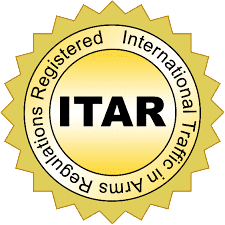What are the potential penalties for ITAR non-compliance?
Violations of the Arms Export Control Act (AECA) can have severe consequences, both financially and in terms of national security. Civil penalties may include fines up to $1 million and/or imprisonment for up to 20 years. In order to ensure compliance with the AECA, the United States Department of State, Directorate of Defense Trade Controls (DTCC) is tasked with handling registration process. U.S. persons, such as corporations, business associations and other entities incorporated in the United States must obtain a DDTC license and pay the related fees prior to engaging in manufacturing, exporting or brokering activities involving U.S or foreign defense articles or services.
Why is ITAR registration important?
21 Categories of Defense Articles Within the USML
The United States Munitions List (USML) is a list of articles, services, and related technology designated as defense and space-related by the United States federal government.
- Firearms, Close Assault Weapons & Combat Shotguns
- Guns & Armament
- Ammunition/Ordinance
- Launch Vehicles, Guided Missiles, Ballistic Missiles, Rockets, Torpedoes, Bombs & Mines
- Explosives & Energetic Materials, Propellants, Incendiary Agents & Their Constituents
- Surface Vessels of War & Special Naval Equipment
- Ground Vehicles
- Aircraft & Related Articles
- Military Training Equipment & Training
- Personal Protective Equipment
- Military Electronics
- Fire Control, Laser, Imaging & Guidance Equipment
- Materials & Miscellaneous Articles
- Toxicological Agents, Including Chemical Agents, Biological Agents & Associated Equipment
- Spacecraft & Related Articles
- Nuclear Weapons Related Articles
- Classified Articles, Technical Data & Defense Services Not Otherwise Enumerated
- Directed Energy Weapons
- Gas Turbine Engines & Associated Equipment
- Submersible Vessels & Related Articles
- Articles, Technical Data & Defense Services Not Otherwise Enumerated

